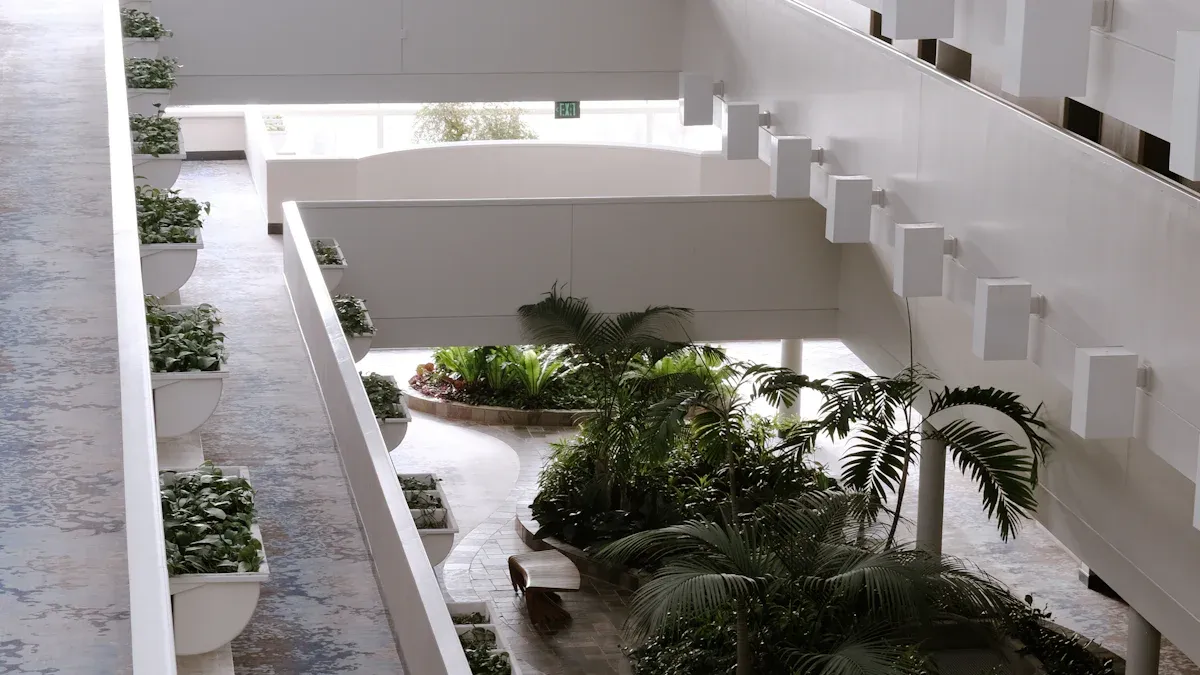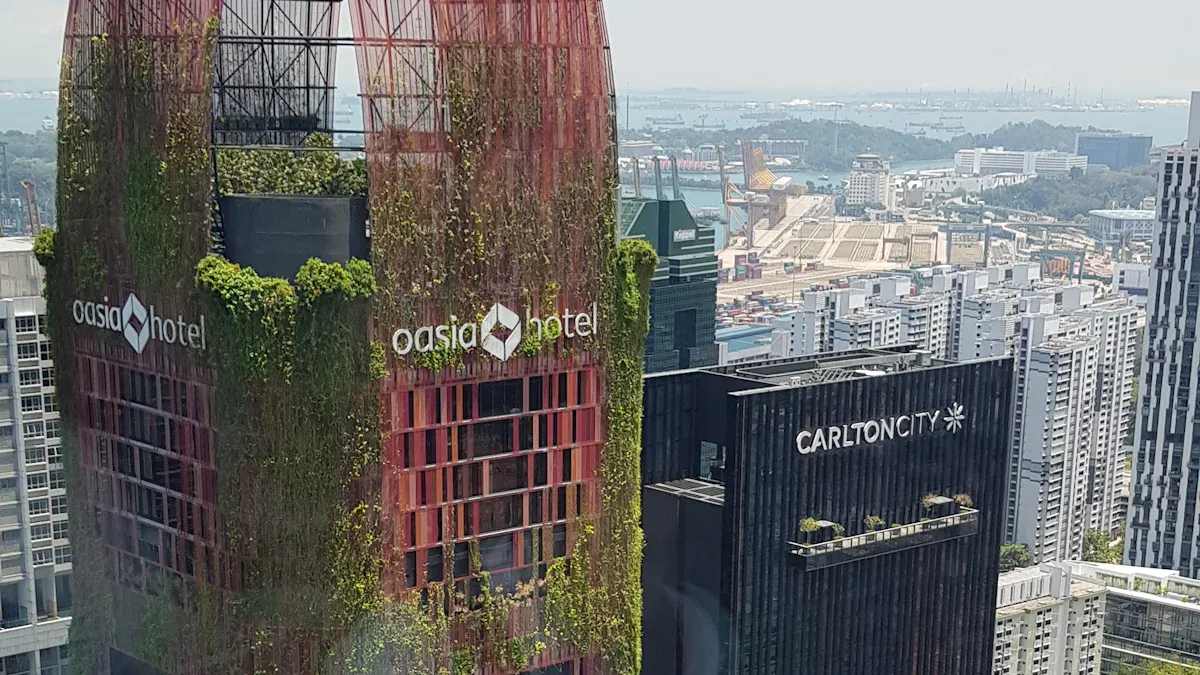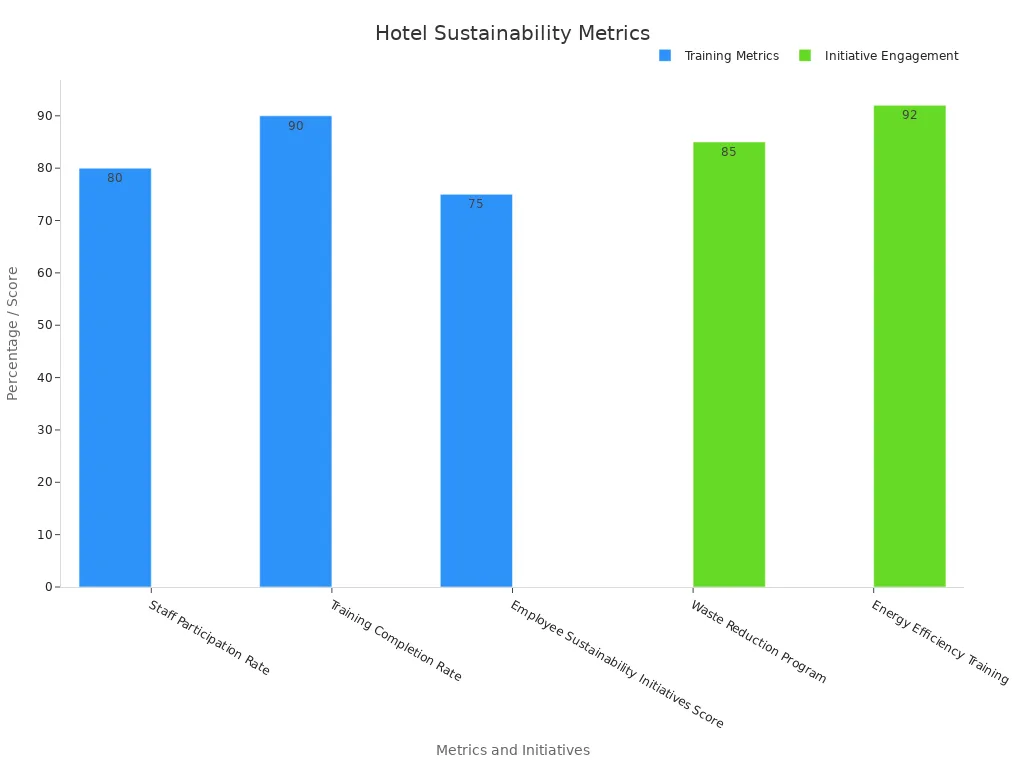-


10 Sustainability Trends in the Hospitality Industry for 2025
Views: 0 Author: Site Editor Publish Time: 2025-07-10 Origin: Site

Sustainability has become a top priority in hospitality management as you face increasing pressure to reduce your environmental impact. The hospitality industry generates up to 15% of the UK’s greenhouse gas emissions and produces nearly 290,000 tonnes of waste annually. Today, 90% of travelers seek responsible choices, and 83% prioritize sustainable tourism. Responsible hospitality management now means adopting sustainability trends that transform hotel operations and guest experiences. When you invest in responsible practices, you not only improve hospitality management but also drive hotel revenue and respond to global demand for a more sustainable hospitality industry.
Key Takeaways
Hotels can cut costs and reduce environmental impact by using renewable energy like solar and wind power.
Improving energy efficiency with smart systems and staff engagement saves money and meets guest demand for green hotels.
Reducing waste through recycling, plastic alternatives, and circular economy practices helps the environment and boosts hotel finances.
Green building, modular construction, and eco-certifications attract loyal guests and improve hotel reputation.
Smart technology, local sourcing, employee training, and guest engagement create a strong, sustainable hospitality experience.
Sustainability Trends 2025
Renewable Energy
You play a crucial role in shaping the future of the hospitality industry by embracing renewable energy. As sustainability trends accelerate, you see more hotels investing in solar panels, wind turbines, and energy storage systems. These solutions help you reduce your reliance on fossil fuels and lower your carbon footprint. For example, countries like Costa Rica, with over 98% renewable energy supply, enable hotels to operate with minimal environmental impact. In contrast, hotels in regions dependent on oil-based energy face higher emissions.
Recent studies show that 70% of global consumers value sustainable living, pushing hospitality management to prioritize renewable energy. You can follow the lead of properties that install photovoltaic carports with EV charging stations, achieving up to 80% energy self-sufficiency. The table below highlights real-world results from hotels that have adopted renewable energy:
Hotel / Chain Renewable Energy Solution Energy Produced / Saved Carbon Footprint Reduction Mandarin Hotel (Chile) 21.6 kWp solar energy plant 19.2 MWh/year 7.5 tons CO₂ reduced annually Vincci Hoteles (Spain) 100% green energy supply 25 GWh/year 1,405 tons CO₂ reduced total Silken Hotels (Spain) Smart energy management system 14% energy savings 143 tons CO₂ avoided annually You can see that renewable energy not only supports sustainability but also delivers measurable benefits for your hotel operations.
Energy Efficiency
Energy efficiency stands out as one of the most impactful sustainability trends in hospitality management. You can implement smart HVAC systems, LED lighting, and advanced insulation to cut energy use and costs. The Ritz-Carlton reduced energy consumption by over 13% across its portfolio through more than 400 energy projects and staff engagement. Hyatt Hotels achieved an 18% reduction at a large resort, saving $270,000 in just two years.
Tip: Engage your staff in energy-saving initiatives. Behavioral change often leads to lasting improvements in hospitality management.
Travelers increasingly seek energy-efficient accommodations. According to recent statistics, 35% of travelers want energy-efficient options, and 76% are more likely to book hotels with green certification.
By prioritizing energy efficiency, you not only meet guest expectations but also future-proof your hospitality management strategy.
Circular Economy
Waste Reduction
You can drive sustainability in your hotel by focusing on waste reduction as a core part of your operations. Hotels generate significant waste, with the sector contributing about 920,000 tonnes of food waste each year. By adopting circular economy models, you benefit from government subsidies, tax incentives, and sustainability-linked loans that improve your financial performance. You also see environmental gains through practices like furniture refurbishment, recycling, and reuse, which extend the lifespan of assets and reduce landfill contributions.
Key performance indicators help you track progress. For example, you can measure recycling sorting accuracy, waste minimization, and operational efficiency. The table below highlights how you can monitor waste reduction in your property:
Metric Type Measurable Outcome Target/Example Value Description/Use Case Recycling Sorting Accuracy Percentage of correctly sorted waste At least 85% Measures accuracy of waste sorting to ensure effective recycling processes. Waste Minimization Percentage reduction in waste Progress toward 90% reduction Tracks overall waste reduction efforts over time in operations. Operational Efficiency Capsule utilization rates, staff efficiency 10% improvement quarterly Assesses operational improvements that contribute to waste reduction and cost savings. Annual Sustainability Goals Energy consumption and waste reduction 25% reduction annually Evaluates long-term environmental impact and progress toward sustainability objectives. KPI Review Frequency Monthly financial KPIs, quarterly operational KPIs, annual sustainability benchmarks N/A Ensures continuous monitoring and adjustment of waste reduction initiatives based on data and feedback. You can set SMART goals, conduct regular audits, and communicate results to your team.
Plastic Alternatives
You play a responsible role in reducing plastic waste by transitioning to plastic alternatives. Discarded plastic amenities can persist in the environment for centuries, harming wildlife and ecosystems. Many hotels now use refillable dispensers for toiletries, solid soap bars, and biodegradable packaging. You can also offer amenities on request and partner with recycling programs to manage unavoidable plastic waste.
Recent research shows that switching to bulk dispensers and non-plastic products significantly lowers your environmental footprint. Regulatory changes, such as bans on single-use plastics, make these sustainable practices essential. By adopting these sustainability practices, you align your hotel with global goals and meet the expectations of responsible travelers.
Green Building

Green building practices set you apart in the hospitality industry. You meet rising guest expectations and gain a competitive edge by adopting sustainable design and construction. Studies show that green hotels attract more loyal customers. When you invest in energy management, waste reduction, water savings, and biodiversity support, you not only protect the environment but also boost your business performance. Research from Vietnam and Colombia confirms that guests trust and revisit hotels with strong green images. Women, in particular, report higher satisfaction with eco-friendly hotels. You fulfill customer expectations, reduce costs, and comply with regulations by making green building a core part of your strategy.
Modular Construction
You can accelerate your hotel projects and minimize environmental impact by choosing modular construction. This method uses prefabricated modules built in controlled factory settings. You benefit from:
Cost savings and shorter development timelines
Reduced waste and optimized resource use
Lower carbon emissions during construction
Improved onsite safety by limiting high-risk activities
Rapid assembly that lets you adapt quickly to market trends
Prefabricated construction supports your energy-saving and emission-reducing goals. Mid- and lower-tier hotels see the greatest benefits, but all properties can improve quality control and avoid weather delays. You help build low-carbon cities and meet sustainability targets by using modular methods.
Eco-Certifications
Eco-certifications give you a measurable advantage in the hospitality market. Hotels with recognized certifications achieve better occupancy rates, higher revenue per available room (RevPAR), and improved average daily rates (ADR). Early adopters of sustainability certifications often outperform their competitors. Studies show that eco-certified hotels manage resources more efficiently and enjoy a stronger green reputation. Some properties even command price premiums of up to 70% in certain markets. You enhance your environmental performance and appeal to eco-conscious travelers by pursuing respected certifications. This approach positions your hotel as a leader in sustainable hospitality.
Water Conservation

Recycling Systems
You can make a significant impact on your hotel's sustainability by adopting advanced recycling systems. These systems help you divert waste from landfills and support your water conservation goals. Many leading hotels now track waste diversion rates, aiming for benchmarks of 75-85%. You can also measure your recycling rate, with top performers reaching 65% or higher. Guest participation plays a key role, with successful programs engaging 40-60% of guests in recycling efforts.
Waste diversion rates: Six Senses Resorts achieved a 90% diversion rate.
Single-use plastics: Many hotels have eliminated 100% of single-use plastics.
Food waste: AccorHotels reduced food waste by 30%, saving €7 million each year.
You can set quarterly targets, such as reducing single-use plastics by 10%, and monitor your progress with real-time tracking systems. Employee training and guest engagement ensure your recycling program remains effective. Publishing annual sustainability reports increases transparency and builds trust with your guests.
Smart Monitoring
Smart monitoring systems give you real-time control over your hotel's water use. These systems track water consumption, detect leaks, and provide instant alerts. You can use predictive analytics to forecast future needs and plan maintenance before problems arise. Smart water meters help you find inefficient fixtures and fix them quickly, preventing water waste.
Real-time tracking allows immediate adjustments to water use.
Leak detection prevents costly repairs and water loss.
Automated controls adjust water systems based on occupancy and weather.
Hotels account for 15% of commercial water use, so optimizing your water conservation strategy is essential. By using smart monitoring, you can save up to 30% on water bills and support your sustainability goals. Case studies from Mediterranean hotels show that water conservation measures not only reduce consumption but also encourage guests to adopt eco-friendly behaviors. When you invest in these technologies, you improve operational efficiency and create a positive experience for your guests.
Carbon Accounting
ESG Reporting
You need to track and report your hotel's carbon footprint to meet both regulatory requirements and guest expectations. ESG reporting gives you a clear framework to measure your environmental impact and show your commitment to sustainable development goals. You can use several standardized tools and metrics to ensure accuracy and transparency:
The European Union’s Product Environmental Footprint Category Rules (PEFCR) help you measure energy and water use, carbon footprint, and waste management.
The World Sustainable Hospitality Alliance’s universal ESG metrics let you compare your performance globally.
The Hotel Carbon Measurement Initiative (HCMI) provides a free tool to calculate your total carbon footprint, carbon per occupied room, and renewable energy use.
The Cornell Hotel Sustainability Benchmarking Index tracks energy efficiency, carbon emissions, and water use per occupied room.
These tools support you in setting science-based targets and aligning your operations with ISO 14068-1:2023 standards. You can benchmark your progress, identify areas for improvement, and communicate your results to stakeholders. By using these frameworks, you take concrete actions aligned with the sdgs and build trust with guests who value sustainability.
Offsetting
You can further reduce your net emissions by investing in carbon offsetting programs. Many hotels now partner with carbon removal projects, such as reforestation or renewable energy initiatives, to balance out their remaining emissions. Industry data shows that hospitality operations contribute about one-third of the sector’s 3% share of global carbon emissions. Most hotels emit between 0.16 and 0.20 tonnes of CO2 equivalent per square meter each year. To address this, 87% of hospitality businesses with climate targets use carbon offsetting as part of their environmental strategies.
You should combine offsetting with real-time feedback for your guests. Studies show that providing feedback on resource use, like water or energy, alongside offsetting programs, leads to real reductions in consumption. This approach helps you move toward carbon-negative operations and supports your sustainable development goals. By taking these steps, you demonstrate leadership and commitment to ambitious climate goals.
Smart Technology
AI and IoT
You can harness AI and IoT to transform your hotel’s sustainability strategy. Smart sensors, automated controls, and real-time analytics help you optimize energy use and reduce waste. For example, Oootopia in Hong Kong installed occupancy sensors and smart A/C controllers, achieving a 30% reduction in HVAC energy consumption each month. Iberostar Group uses AI to monitor and cut food waste, supporting its goal of zero waste by 2025. Marriott Hotels adopted water-saving kitchen technologies, reducing water use by up to 70%.
Academic research shows that smart hotels use IoT devices and AI-driven services to personalize guest experiences and lower their carbon footprint. IoT sensors track energy use in real time, while AI chatbots inform guests about green initiatives. These systems encourage sustainable behaviors and support technology at the service of sustainability.
Note: Guests are more likely to participate in eco-friendly actions when you provide user-friendly smart amenities, such as in-room tablets for lighting and temperature control.
The table below highlights the benefits of integrating AI and IoT in hotel operations:
Benefit Area Description Energy Management Systems IoT-enabled systems reduce energy consumption and costs, supporting sustainability initiatives. Operational Efficiency Automation of routine tasks reduces labor costs and optimizes hotel operations. Guest Experience Personalized services and seamless experiences increase guest satisfaction and loyalty. Security IoT security solutions ensure safety for guests and staff. Tailored Integration Leading IT providers customize IoT solutions to your property’s needs. Digital Guest Engagement
You can elevate your hotel’s digital transformation by adopting smart room technologies. Contactless check-ins, keyless entry, and guest messaging platforms reduce paper and plastic waste. Hilton’s Connected Room system powers down devices when rooms are vacant, saving energy and lowering costs.
Hotels that combine smart technology with sustainability efforts see up to 20% reductions in energy use. About 70% of travelers now prefer hotels that offer these innovations. Digital guest engagement tools, such as mobile apps and in-room tablets, give guests control over their environment and access to sustainability information. These features drive higher satisfaction and loyalty.
You can use digital platforms to share real-time feedback on resource use, promote green initiatives, and reward guests for eco-friendly choices. This approach not only supports your sustainability goals but also creates memorable, personalized experiences for every guest.
Sustainable Sourcing
Local Supply Chains
You can strengthen your hotel's sustainability by building local supply chains. When you source food and materials from nearby producers, you cut down on transport emissions and support your community. Local supply chains help you reduce your carbon footprint because food travels shorter distances and arrives fresher, which means less spoilage and waste. You also avoid the need for excessive packaging and long-haul shipping, both of which harm the environment.
Local sourcing supports farmers and creates jobs in your area.
Guests enjoy fresher, higher-quality meals and products.
You build loyalty with travelers who value responsible choices.
Note: Regulatory changes, such as the EU's Corporate Sustainability Reporting Directive, now require hotels to track and report their carbon emissions. Local supply chains make it easier for you to provide accurate sustainability data and meet these new standards.
Eco-Friendly Products
You can boost your hotel's reputation and environmental performance by choosing eco-friendly products. These products, made from natural or recycled materials, help you minimize waste and conserve resources. Many hotels now use amenities like biodegradable toiletries, upcycled furniture, and linens made from organic fibers. These eco-friendly initiatives not only lower your environmental impact but also attract guests who care about sustainability practices.
A recent study found that 70% of travelers prefer hotels that use eco-friendly initiatives. Guests also look for environmental information before booking, and they are more likely to recommend hotels that adopt responsible and sustainable practices. You can measure your progress using tools like the Hotel Carbon Measurement Initiative and the Hotel Waste Measurement Methodology, which track your resource use and waste reduction.
Eco-Friendly Product Benefit Biodegradable amenities Reduce landfill waste Upcycled furniture Save resources and energy Organic linens Lower water and chemical use By making responsible choices in your supply chain, you create a positive impact on both your business and the environment.
Employee & Community
Training Programs
You drive sustainability in your hotel by investing in employee training programs. These programs build essential skills and motivate your staff to support green initiatives every day. When you offer structured training, you see higher engagement and better results in your sustainability efforts. Employees who complete environmental training report greater job satisfaction and a stronger sense of purpose.
Staff who participate in sustainability training show improved awareness and commitment.
Green human resource management, including green recruiting and compensation, encourages regular involvement in responsible practices.
Motivated employees help you implement initiatives that reduce waste and save energy.
Recognizing staff contributions fosters a culture of sustainability and lowers turnover.
You can measure the impact of your training programs using clear benchmarks:
Metric Benchmark Value Impact on Sustainability Skills Staff Participation Rate 80% High engagement in sustainability training programs Training Completion Rate 90% Improved knowledge and skill acquisition Employee Sustainability Score 75/100 Effective application of sustainability skills 
Local Initiatives
You strengthen your hotel's connection with the local community by supporting local initiatives. These efforts include sourcing food from nearby producers, partnering with local organizations, and integrating diverse individuals into your workforce. When you collaborate with the local community, you create shared value and boost your hotel's reputation.
Local sourcing reduces your carbon footprint and supports economic growth in the local community.
Community involvement increases guest loyalty and recognition for your responsible business practices.
Staff engagement in local initiatives, such as clean-up events or educational workshops, builds a positive connection with the local community.
You can use these partnerships as part of your marketing strategy to attract guests who value a strong connection with the local community. By investing in people and place, you ensure your sustainability journey benefits everyone.
Wellness & Sustainability
Plant-Based Menus
You can elevate your hotel's sustainability profile by expanding plant-based menu options. Many guests now seek healthier and more eco-friendly dining experiences. Hotels that offer plant-based, gluten-free, and organic menu items attract health-conscious travelers and support your sustainability goals. You see this trend in high-profile restaurants like Eleven Madison Park in New York, which moved to a fully plant-based menu to reduce environmental impact while maintaining top culinary standards. Parisian venues such as Sapid also show how plant-based dishes can deliver refined flavors without animal products.
You notice that flexitarians—guests who eat both plant-based and animal-based foods—drive much of the demand. Around 50% of consumers now eat more plant-based foods than last year, and 62% enjoy meatless meals weekly. Environmental concerns, health awareness, and rising meat prices all contribute to this shift. However, you may face challenges, such as customer resistance or fears about revenue loss. Gradual, inclusive promotion works best. You should balance plant-based and traditional options to keep all guests satisfied.
Plant-based menus support wellness and sustainability.
Local sourcing, seasonal ingredients, and waste reduction enhance your impact.
Innovative dining experiences and technology integration boost guest engagement.
Alcohol-free and low-alcohol beverages complement wellness-focused menus.
Aspect Details Consumer Adoption 50% eat more plant-based foods; 62% eat meatless meals weekly Market Forecast Plant-based food sales projected to reach $162 billion by 2030 Business Impact Attracts flexitarians, vegetarians, and vegans; future-proofs business Tip: Collaborate with chefs and health professionals to create appealing, healthy plant-based dishes that meet diverse guest preferences.
Nature Activities
You can further enhance guest wellness by offering nature-based activities. Many travelers now prioritize experiences that connect them with the outdoors. Guided hikes, forest bathing, and outdoor yoga sessions help guests relax and recharge. These activities promote both physical and mental well-being.
You support sustainability by designing programs that protect local ecosystems. Use local guides and partner with conservation groups to ensure responsible tourism. Nature activities also encourage guests to appreciate and respect the environment, reinforcing your hotel's commitment to sustainability.
Nature walks and wildlife tours foster guest engagement with local biodiversity.
Outdoor fitness classes and meditation sessions improve guest satisfaction.
Eco-friendly excursions, such as kayaking or cycling, reduce your carbon footprint.
You create memorable experiences that set your hotel apart and build lasting guest loyalty.
Consumer Education
Gamification
You can boost guest engagement in sustainability by using gamification strategies. Many hotels now offer loyalty programs, mobile apps, and guest incentives that reward eco-friendly actions. When you introduce points, badges, or achievements for behaviors like towel reuse or energy saving, you motivate guests to participate in green practices. Gamified apps often include leaderboards, storytelling, and interactive challenges that make sustainability fun and memorable.
The table below highlights key findings from recent research on gamification in hospitality:
Aspect Evidence Summary Sample Size & Demographics 437 U.S. hotel guests, majority aged 31-45, over half with a Bachelor's degree Gamification Elements Points, achievements, badges for pro-environmental behaviors Behavioral Outcomes Achievements influence attitudes and revisit intentions Moderating Factors Green hotel experience, gender, and green trust affect effectiveness Practical Examples Major hotel chains use gamified apps to increase engagement Key Findings Task complexity and achievement motives impact guest attitudes and intentions You can personalize these programs by tailoring challenges to different guest profiles. When you build green trust and offer meaningful rewards, you encourage guests to return and support your sustainability goals.
Behavior Change
You can drive real impact by designing behavior change programs that encourage guests to adopt sustainable habits. Many hotels use social norm messaging, eco-feedback devices, and targeted campaigns to promote actions like towel reuse and water conservation. For example, a field experiment in European hotels used real-time feedback during showers, leading to a 25.79% reduction in water use per shower. Guests saved an average of 10 liters each time. Messaging that appeals to selfless motivations and sets high-effort goals proves most effective.
While some interventions show mixed results, you can maximize success by combining smart technology with behavioral science. Programs that provide instant feedback and clear incentives help guests make greener choices. You can also launch green stay campaigns, offer carbon footprint calculators, and give discounts for sustainable choices. These initiatives not only reduce your environmental impact but also create a positive guest experience.
Tip: Celebrate guest achievements and share their impact to inspire ongoing participation in your sustainability journey.
You secure the future of your hotel by embracing sustainability trends in hospitality management. Assess which strategies best fit your goals and operations. Start with energy-efficient lighting, smart guest room systems, or local sourcing. The table below highlights how these actions benefit your hospitality management:
Trend Benefit Renewable Energy Cuts energy costs, lowers environmental impact Water Conservation Reduces utility bills Waste Reduction Lowers disposal expenses Community Engagement Boosts brand reputation By acting now, you strengthen your hospitality management, attract more guests, and create lasting value in the hospitality industry.
FAQ
What is the most cost-effective sustainability trend for hotels in 2025?
You can start with energy efficiency upgrades. LED lighting, smart thermostats, and occupancy sensors offer quick returns. These solutions lower utility bills and require minimal upfront investment. Many hotels see payback within two years.
How do you measure the success of sustainability initiatives?
You track key performance indicators (KPIs) like energy use, waste diversion rates, and water savings. Regular audits and guest feedback help you evaluate progress. Use digital dashboards for real-time monitoring.
Do guests really care about eco-friendly hotels?
Yes, most travelers now prefer sustainable options. Surveys show that 90% of guests seek responsible choices. You attract more bookings and build loyalty by promoting your green initiatives.
How can you involve staff in sustainability programs?
You provide training, set clear goals, and recognize achievements. Staff engagement increases when you offer incentives and share results. Team challenges and regular updates keep everyone motivated.
Related Articles-
What Is Contract Grade Furniture
20 August,2025 - 20 August,2025
-
What's The Average Size of A Banquet Table?
20 August,2025 - 20 August,2025
-
Top 5 Banquet Furniture Manufacturers in The World
20 August,2025 -
The Timeless Charm of Bentwood Chairs in Hospitality Design
20 August,2025 -
How to Choose the Suitable Hotel Lobby Furniture
09 August,2025 -
Veneer vs. Laminate: Key Differences and Which to Choose
06 August,2025 -
What's Hotel FF&E Installation?
09 July,2025 -
What Is Hospitality Furniture And Why It Matters for Hotels
08 July,2025
Product Category
Contact Us
Factory Address: No#268 Dongcheng road, Hecheng street, Gaoming district, Foshan city, Guangdong Province, ChinaShowroom Address: NO.12-18,3rd Floor, Block 3, South of Sunlink,Lecong Town, Shunde District, Foshan City, Guangdong
Province, ChinaEmail address: joannapeng@pakenfurniture.comCel / WhatsApp: +86-13928285584Tel: +86-757-28908507Copyright © 2023 Foshan Paken Furniture Co.,Ltd. All rights reserved. Support by Leadong| Sitemap. Privacy Policy






















